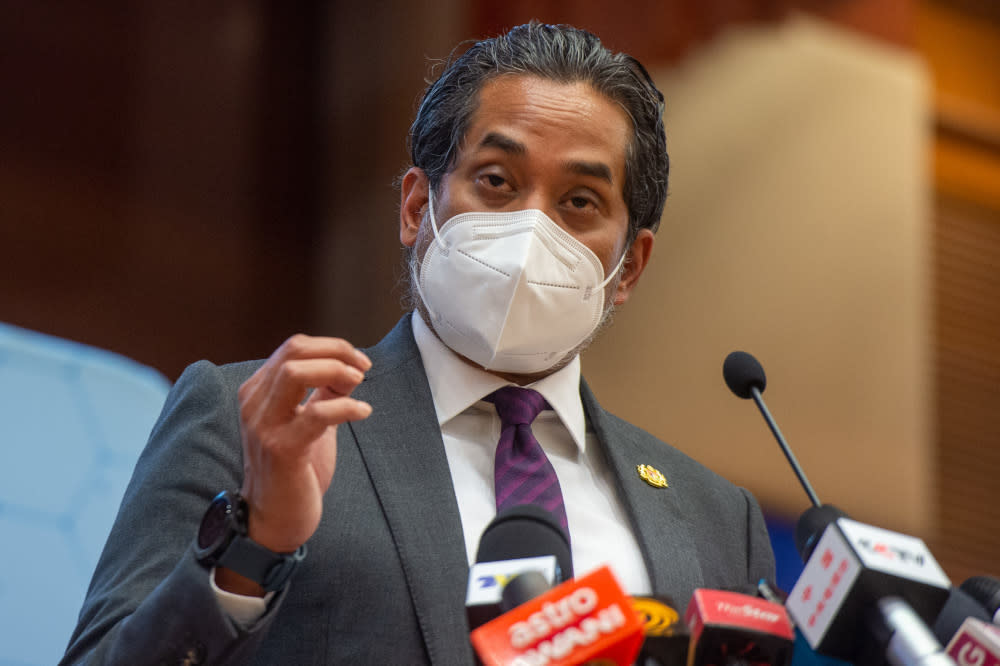Khairy: Severe Covid-19 cases down nationally, but rose in some states after interstate travel allowed

KUALA LUMPUR, Oct 21 — While Malaysia’s Covid-19 case numbers have been on the decline overall, several states have been registering a worrying uptick, Health Minister Khairy Jamaluddin said.
In a press conference today, Khairy noted Selangor, Putrajaya, Sarawak and Negri Sembilan have all been reporting increases.
The minister said that at the national level, the number of Covid-19 patients treated in health facilities have been declining from week to week.
“However, attention must be given to the following findings; the states of Sarawak, Kelantan and Selangor still show the use of non-ICU beds and ICU beds in excess of 60 per cent, Penang and Perak still show bed usage levels above 50 per cent.
“If we look at the graph of the number of Covid-19 patient admissions to public hospitals and public quarantine and treatment centres (PKRC) for the Central Zone (Selangor, Federal Territory of Kuala Lumpur and Putrajaya), the graphs for Selangor and Putrajaya began to show an increasing trend after approval for interstate was granted on October 11, 2021,” Khairy added, showing charts of on the situation.
He said that similar situations have also been noted in Sarawak, especially involving Categories 3,4 and 5 patients that require hospitalisation, after interstate travel was allowed to resume.
“The data is for per 100,000 population. Likewise, the Covid-19 patient admissions trend for Categories 3,4 and 5 to public hospitals in the southern zone, whereby Negri Sembilan has started showing an uptick trend beginning epid week 40,” he added.
“Just that we are giving early warning. This is MOH’s job. If we warn when the system is going to collapse, it’s too late already.”
“So, before the system is pressured, though we have the capacity now that is enough, but Tan Sri (Dr Noor Hisham Abdullah) and I do not want it to go to the extent where the system is pressured and paralysed.
“So, we have to give you early warning that the leading indicator is not that good,” he added further, when asked if the government would be looking at imposing another lockdown and banning interstate travel activities.
On October 10, the federal government officially announced the lifting of full interstate travel restrictions beginning October 11.
In a special address, Prime Minister Datuk Seri Ismail Sabri Yaakob said the announcement follows the promise made by the government on allowing interstate travel after the overall vaccination rate threshold is reached.
He also said the government has agreed to allow Malaysians traveling abroad without the need to apply for the MyTravelPass from the Immigration Department beginning tomorrow as well.
On September 22, Ismail Sabri said that interstate travel would resume when 90 per cent of the adult population in Malaysia have been fully vaccinated
According to the National Security Council (NSC), complete vaccinations are defined as those who have passed 14 days from the day they received their second dose for vaccines requiring two shots (Pfizer, AstraZeneca, Moderna, Sinopharm and Sinovac).
As for vaccines requiring only one shot (Johnson & Johnson and CanSino), complete vaccination is defined as those who have passed 28 days upon receiving their shots.
In a press conference later, Ismail Sabri assured that the interstate travel relaxation will not be rescinded should Covid-19 infections begin resurfacing now that people were able to travel freely.
Related Articles Muhyiddin, wife get Covid-19 booster shots in KL Vietnam to open Phu Quoc island to vaccinated tourists in Nov Khairy reminds politicians to mask up, saying some have health issues, ‘probably obese’



